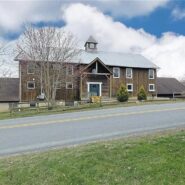The Weekenders: Important Things About Taxes
Kim McGalliard | September 21, 2012
A pretty picture of what it will hopefully look like in a few weeks to distract you from the unpleasant topic I discuss below.
For people with kids, September means back to school time. For people with property, it means school tax time. Once you own property in New York State, you will (depending on your town/county)* get at least two tax bills each year: a property tax bill (which can include town and county taxes) and a school tax bill (which can include a library tax). You get your property tax bill in January and your school tax** bill in September (nice of them to spread the pain, right?). Unfortunately, our first year in the house, we seriously over-paid our taxes (by almost twice as much). Because of that, Mr. Sticks and I subsequently did a lot of research about how property taxes work in order to stop over paying taxes. Hopefully the information I’m about to impart will help you do the same.
When it comes to taxes, the most important number you need to know is the Total Assessed Value of your property. This is the number that your tax is based on and it is the only number that you have any chance of contesting. The total assessed value of your property is based on market value – what a “willing buyer will pay a willing seller under normal circumstances.” But, in some towns and counties it can be more complicated than this. I won’t go into real detail here, but in some towns and counties, they can choose to use the Uniform Percentage of Market Value which means they will base your tax rate on a percentage of the value of your property in an effort to even out taxes across all property owners. It’s not complicated, but it’s more than I want to go into this post. You can read more about it here.
The way they then figure your actual taxes isn’t extremely complex either. Each year the tax levy is figured based on the amount of money your town and county has budgeted minus the amount of money they can raise through means besides property taxes. The tax rate is then figured to collect this amount of money from all property owners in the town and county. You can read all about how this is figured on the NYS tax web site that has lots of helpful information.
The long and the short of it is that you have some control over the assessment of your property, but the only control you have is over the tax rate, and thus the only way to otherwise lower the amount of taxes you actually pay is by getting involved in local politics and changing budgets or finding ways to bring more income to your town or county. A good explanation of the difference between assessments and taxes, and how they are dependent on each other, is also on the NYS tax site.
The other important things to know are a few dates:
- Valuation date – this is the date the town will use as the starting date determining what your property is worth. It’s an “As of” date. It is usually, but not always, July 1. This is also usually the date when the assessments are finalized.
- Taxable status date – the date “the assessment reflects the ownership and physical condition of the property.” This is usually March 1.
- Tentative roll date – The date the town publishes assessments for all properties
- Grievance date – the deadline for filing a disagreement or grievance about the ASSESSMENT of your property (not the actual taxes – just the assessment). This is often the second Tuesday in May.
What this really means: if you purchase property after July 1 of the previous year and March 1 of the next year, your assessment should be the price you paid for the house. If when you check your assessment on May 1 and your property is assessed for more (or, if you’re a lucky, for less) than what you paid for it, and you bought it between July 1 of the previous year and March 1 of the next year, you can contest your assessment, as long as you do so before the grievance date.
This is where we messed up. We closed on our house on Febuary 28 – before the March 1 deadline. Since we were in contact with the town clerk about our sale due to some appraisal and zoning issues and because we’d filled in a form with her clearly stating the sale price and the date of the sale, we naively assumed that she would change our assessment to reflect the sale price (almost half of what the assessment had been). Stupidly, we never checked the assessment when it came out on May 1. We didn’t even know that we should do this. So we didn’t see that she hadn’t changed our assessment. The grievance date came and went. We got our tax bill. We were upset/angry/out a few thousand dollars.
So the moral of the tax story: It is your responsibility to CHECK YOUR ASSESSMENT! Every year! Especially after you first purchase your property, or if the town as done a reassessment. Do not depend on your lawyer to clue you into this, nor your real estate agent. Neither of ours did. If your property is over assessed, the town assessor will most likely not tell you. Their job is to collect as much money for the town as they possibly can.
Here’s a link you can go to to check your assessment. Or you can go to the GIS maps I posted links to a few weeks ago on the post I did about property research since GIS records show current assessments as well. What do you do if your assessment is less than what you paid for your property? It’s up to you. You can contest it and give the town information about the higher value of your property, thus most likely raising your taxes. Most people probably don’t do this.
Many towns also do regular reassessments of entire towns. Reassessment and if/when it happens it varies greatly by town and county. Towns are required to notify you if they are going to do a reassessment. Reassessments don’t necessarily mean you’re your taxes will go up. This site also includes a list of towns by county and when they did reassessments. When a town does a reassessment, they bring in a team of independent assessors from another part of the state who will meet with property owners to discuss assessments. It can be a good idea to make an appointment with them when this happens and discuss your situation with them so you understand the assessment and the tax rate that is being charged.
If you disagree with your assessment you can contest the assessment. Often this means sitting down with the assessor and discussing why you think your assessment is incorrect. Hopefullly, none of you will ever have to do this.
Just for fun, here’s a list of 2011 Average NYS Residential tax by county.
*An accuracy note: Many of these things vary from town to town and county to county – dates, rules, rates. Check your town or county web site for specific details.
**A political note: Obviously, taxes in all shapes and forms have been a big topic of conversation this year. Property taxes make sense to people in general – to sensible people at least. These taxes help pay for roads, bridges, snow removal, maintenance etc. etc. School taxes can be more controversial. We don’t have kids, and usually, weekenders who have kids don’t send their kids to the schools in the town of your weekend home. In some ways this sucks, but at the same time, I believe that we all have some responsibility to help improve the communities we live in, and I feel that one of the best ways to improve communities is to support education.
Read On, Reader...
-

Jane Anderson | April 1, 2024 | Comment A Westtown Barn Home with Stained-Glass Accents: $799.9K
-

Jane Anderson | March 25, 2024 | Comment A c.1920 Three-Bedroom in Newburgh: $305K
-

-

Jaime Stathis | February 15, 2024 | Comment The Hudson Valley’s First Via Ferrata at Mohonk Mountain House
